一般将来时的知识点
一般将来时 知识点
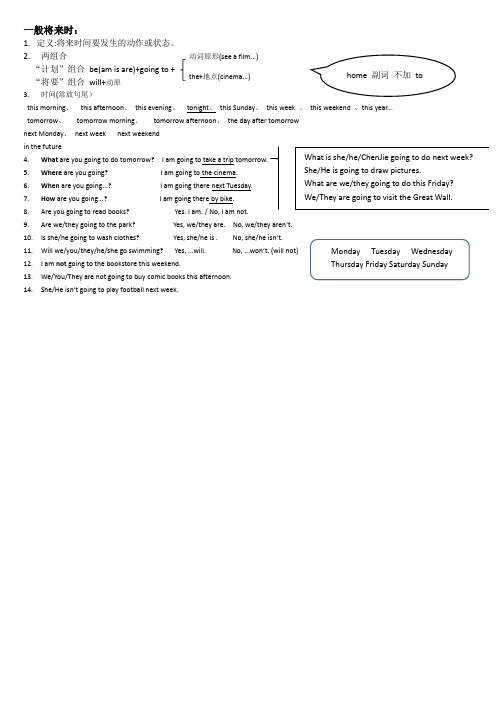
一般将来时:1. 定义:将来时间要发生的动作或状态。
2. 两组合 “计划”组合 be(am is are)+going to + “将要”组合 will+动原3. 时间(常放句尾) this morning 、 this afternoon 、 this evening 、 tonight 、 this Sunday 、 this week 、 this weekend 、this year... tomorrow 、 tomorrow morning 、 tomorrow afternoon 、 the day after tomorrownext Monday 、 next week next weekendin the future4.What are you going to do tomorrow?I am going to take a trip tomorrow. 5.Where are you going?I am going to the cinema. 6.When are you going...? I am going there next Tuesday. 7.How are you going...? I am going there by bike. 8.Are you going to read books? Yes. I am. / No, I am not. 9. Are we/they going to the park? Yes, we/they are. No, we/they aren ’t. 10. Is she/he going to wash clothes? Yes, she/he is . No, she/he isn ’t.11. Will we/you/they/he/she go swimming? Yes, ...will. No, ...won ’t. (will not)12. I am not going to the bookstore this weekend.13. We/You/They are not going to buy comic books this afternoon.14. She/He isn ’t going to play football next week. 动词原形(see a film...)the+地点(cinema...)。
六年级一般将来时知识点及练习
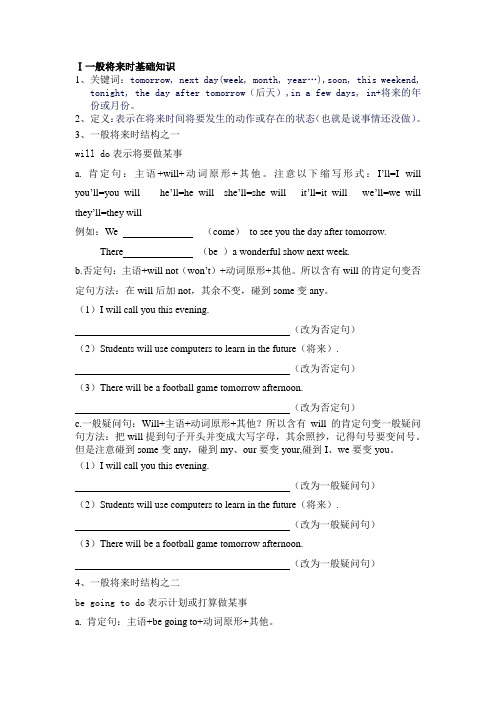
Ⅰ一般将来时基础知识1、关键词:tomorrow, next day(week, month, year…),soon, this weekend,tonight, the day after tomorrow(后天),in a few days, in+将来的年份或月份。
2、定义:表示在将来时间将要发生的动作或存在的状态(也就是说事情还没做)。
3、一般将来时结构之一will do表示将要做某事a. 肯定句:主语+will+动词原形+其他。
注意以下缩写形式:I’ll=I will you’ll=you will he’ll=he will she’ll=she will it’ll=it will we’ll=we will they’ll=they will例如:We (come)to see you the day after tomorrow.There (be )a wonderful show next week.b.否定句:主语+will not(won’t)+动词原形+其他。
所以含有will的肯定句变否定句方法:在will后加not,其余不变,碰到some变any。
(1)I will call you this evening.(改为否定句)(2)Students will use computers to learn in the future(将来).(改为否定句)(3)There will be a football game tomorrow afternoon.(改为否定句)c.一般疑问句:Will+主语+动词原形+其他?所以含有will的肯定句变一般疑问句方法:把will提到句子开头并变成大写字母,其余照抄,记得句号要变问号。
但是注意碰到some变any,碰到my、our要变your,碰到I、we要变you。
(1)I will call you this evening.(改为一般疑问句)(2)Students will use computers to learn in the future(将来).(改为一般疑问句)(3)There will be a football game tomorrow afternoon.(改为一般疑问句)4、一般将来时结构之二be going to do表示计划或打算做某事a. 肯定句:主语+be going to+动词原形+其他。
高中英语一般将来时知识点总结

高中英语一般将来时知识点总结高中英语一般将来时知识11.1 一般将来时的构成肯定句:主语 + shall/will + 动词原形...否定句:主语 + shall/will + not + 动词原形...疑问句:Shall/Will + 主语 + 动词原形...?疑问代词/疑问副词 + shall/will + 主语 + 动词原形...?1.2 一般将来时的肯定句句型:主语 + shall/will + 动词原形....在书面语中,如果主语是第一人称,常用“助动词shall + 动词原形”构成一般将来时的肯定句,即“I/we + shall + 动词原形”;shall可缩写为'll:If I have time tomorrow,I think I'll get a haircut.如果我明天有时间,我想去理个发在口语中,所有的人称都可以用will,即“主语(所有人称) + will + 动词原形...”;will可缩写为'll:Some day,I'll tell you.将来某一天我会告诉你的。
1.3 一般将来时的否定句句型:主语 + will/shall + not + 动词原形...一般将来时的否定句是在will/shall后加not;will not可缩写为won't;shall not可缩写为shan't:Mary won't go to the party.玛丽不会去参加晚会。
1.4 一般将来时的一般疑问句句型:Shall/Will + 主语 + 动词原形...回答方式:Yes,主语 + shall/will.No,主语 + shall/will + not.一般将来时的一般疑问句是将助动词shall/will置于主语之前(大写shall/will的第一个字母),在句尾加问号;这种语序是主语和谓语倒装语序:Will he come? 他来吗?Will you be at our next meeting? 我们下次开会你来吗?Will you be free tonight? —Yes,I will./No,I won't(be free).今晚你有空吗? ——是,我有空。
一般将来时语法知识点
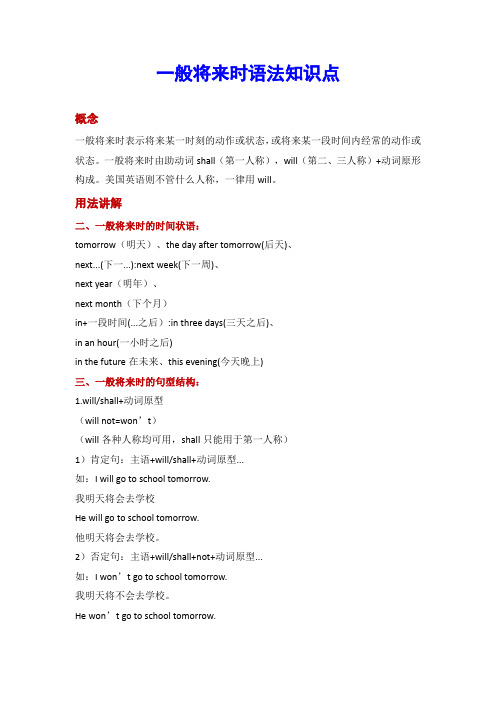
一般将来时语法知识点概念一般将来时表示将来某一时刻的动作或状态,或将来某一段时间内经常的动作或状态。
一般将来时由助动词shall(第一人称),will(第二、三人称)+动词原形构成。
美国英语则不管什么人称,一律用will。
用法讲解二、一般将来时的时间状语:tomorrow(明天)、the day after tomorrow(后天)、next...(下一...):next week(下一周)、next year(明年)、next month(下个月)in+一段时间(...之后):in three days(三天之后)、in an hour(一小时之后)in the future在未来、this evening(今天晚上)三、一般将来时的句型结构:1.will/shall+动词原型(will not=won’t)(will各种人称均可用,shall只能用于第一人称)1)肯定句:主语+will/shall+动词原型...如:I will go to school tomorrow.我明天将会去学校He will go to school tomorrow.他明天将会去学校。
2)否定句:主语+will/shall+not+动词原型...如:I won’t go to school tomorrow.我明天将不会去学校。
He won’t go to school tomorrow.他明天将不会去学校。
3)一般疑问句:Will/Shall+主语+动词原型...如:Will you go to school tomorrow?你明天要去学校吗?Will he go to school tomorrow?他明天要去学校吗?肯定回答:Yes,主语+will.如:Yes,I will.Yes,he will.否定回答:No,主语+will+not.如:No,I won’t.No,he won’t.4)特殊疑问句:特殊疑问词+will/shall+主语+动词原型... 如:What will you do tomorrow?你明天将会做什么?What will he do tomorrow?他明天将会做什么?2.be going to+动词原型1)肯定句:主语+be going to+动词原型...如:I am going to buy some books tomorrow.我明天打算去买一些书。
初中英语知识点总结:一般将来时

知识点总结顾名思义,一般将来时表示将来某一时刻的将要发生动作或状态,或将来某一段时间内经常的动作或状态。
常常和表示将来的时间状语连用,如:tomorrow(明天),next week (下周),from now on(从现在开始);in the future(将来)等。
一、基本结构及用法1、will / shall + 动词原形这种方法一般单纯地表示将来某个时间将要发生的动作或存在的状态。
will用于各种人称will 常简略为'll,并与主语连写在一起,如:I'll,he'll,;shall只用于第一人称,在肯定句或否定句中表示将要或不会发生的事情或动作,在疑问句中可以表示建议或征求对方意见。
变否定句在will / shall后加not,缩略形式为won't;变疑问句把will / shall提到主语前。
例如: I will / shall go to visit him next week. 下周我将去拜访他。
What time shall we go there tomorrow? 明天我们几点去那儿?2、be going to 动词原形(否定句、疑问句的变化体现在be动词上)1)表示计划、打算、准备做的事。
例如:We are going to put up a building here.我们打算在这里盖一座楼。
How are you going to spend your holidays?假期你准备怎样过?2)表示即将发生或肯定要发生的事。
例如:I think it is going to snow. 我看要下雪了。
3、用现在进行时表示表示位置转移的动词(如:go, come, leave, start, arrive等),可用现在进行时表示将来时。
如: Uncle Wang is coming. 王叔叔就要来了。
常见考法对于一般将来时的考查,多以单选、句型转换或词语运用的形式考查学生在具体语境中灵活运用时态的能力。
一般将来时知识点(大全)(word)
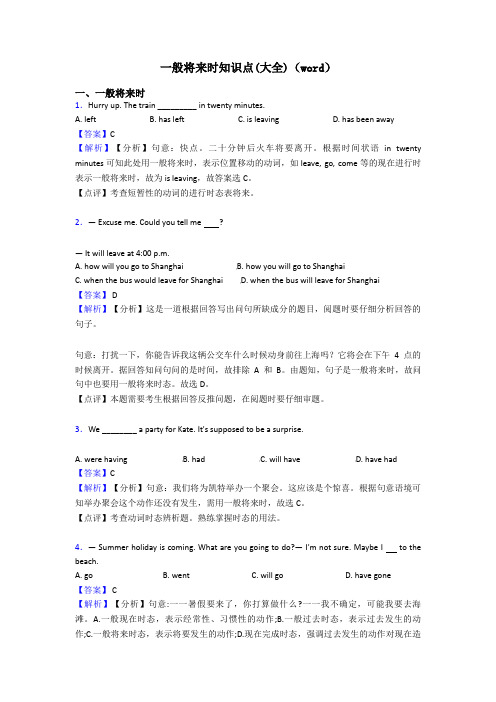
一般将来时知识点(大全)(word)一、一般将来时1.Hurry up. The train _________ in twenty minutes.A. leftB. has leftC. is leavingD. has been away【答案】C【解析】【分析】句意:快点。
二十分钟后火车将要离开。
根据时间状语in twenty minutes可知此处用一般将来时,表示位置移动的动词,如leave, go, come等的现在进行时表示一般将来时,故为is leaving,故答案选C。
【点评】考查短暂性的动词的进行时态表将来。
2.— Excuse me. Could you tell me ?— It will leave at 4:00 p.m.A. how will you go to ShanghaiB. how you will go to ShanghaiC. when the bus would leave for ShanghaiD. when the bus will leave for Shanghai【答案】 D【解析】【分析】这是一道根据回答写出问句所缺成分的题目,阅题时要仔细分析回答的句子。
句意:打扰一下,你能告诉我这辆公交车什么时候动身前往上海吗?它将会在下午4点的时候离开。
据回答知问句问的是时间,故排除A和B。
由题知,句子是一般将来时,故问句中也要用一般将来时态。
故选D。
【点评】本题需要考生根据回答反推问题,在阅题时要仔细审题。
3.We ________ a party for Kate. It's supposed to be a surprise.A. were havingB. hadC. will haveD. have had【答案】C【解析】【分析】句意:我们将为凯特举办一个聚会。
这应该是个惊喜。
根据句意语境可知举办聚会这个动作还没有发生,需用一般将来时,故选C。
一般将来时态知识点详解(初中英语专项复习) (4)
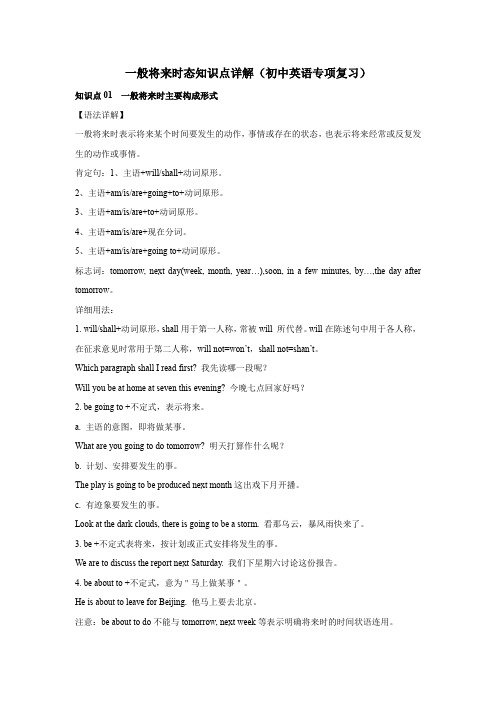
一般将来时态知识点详解(初中英语专项复习)知识点01 一般将来时主要构成形式【语法详解】一般将来时表示将来某个时间要发生的动作,事情或存在的状态,也表示将来经常或反复发生的动作或事情。
肯定句:1、主语+will/shall+动词原形。
2、主语+am/is/are+going+to+动词原形。
3、主语+am/is/are+to+动词原形。
4、主语+am/is/are+现在分词。
5、主语+am/is/are+going to+动词原形。
标志词:tomorrow, next day(week, month, year…),soon, in a few minutes, by…,the day after tomorrow。
详细用法:1. will/shall+动词原形,shall用于第一人称,常被will 所代替。
will在陈述句中用于各人称,在征求意见时常用于第二人称,will not=won’t,shall not=shan’t。
Which paragraph shall I read first? 我先读哪一段呢?Will you be at home at seven this evening? 今晚七点回家好吗?2. be going to +不定式,表示将来。
a. 主语的意图,即将做某事。
What are you going to do tomorrow? 明天打算作什么呢?b. 计划、安排要发生的事。
The play is going to be produced next month这出戏下月开播。
c. 有迹象要发生的事。
Look at the dark clouds, there is going to be a storm. 看那乌云,暴风雨快来了。
3. be +不定式表将来,按计划或正式安排将发生的事。
We are to discuss the report next Saturday. 我们下星期六讨论这份报告。
一般将来时知识点

一般将来时一、知识梳理(一)基本用法1.概念一般将来时表示将来某一时刻的动作或状态,或将来某一段时间内经常的动作或状态。
2.构成基本构成句型例句am/is/are going todo肯定句I am going to go fishing next weekend.否定句I am not going to go fishing next weekend.一般疑问句Are you going to go fishing next weekend?特殊疑问句What are you going to do next weekend?will/shall do肯定句I shall/will visit my grandmother on Sunday.否定句I shall/will not(won’t)visit my grandmotheron Sunday.一般疑问句---Will you visit my grandmother on Sunday?---Yes,I will./No,I won’t.特殊疑问句What will you do on Sunday?3.常用时间状语明天下个XX后明天:tomorrow,后面可以加morning,afternoon,evening下个:next,后面可以加week,month,year等XX后:after和in,后面可以加three weeks/months/years这里要注意一下,after后加时间点才表示将来,如after3o’clock。
加时间段表示过去,如after2hours表示过去。
in后加时间段表将来,如in two years。
(二)考点1.will和shall的区别will可用于所有人称,但shall仅表示单纯将来时,用于第一人称I和we,作为will的一种替代形式。
以You and I为主语时通常避免用shall。
如:He will be back soon.他很快就会回来。
一般将来时的知识点

一般将来时的知识点1.构成一般将来时的基本句型:a. 使用“will”加上动词原形:主语 + will + 动词原形 + 其他补充信息。
例如:I will go to the movies tonight.(今晚我要去看电影。
)b. 使用“be going to”加上动词原形:主语 + be going to + 动词原形 + 其他补充信息。
例如:She is going to visit her grandparents next week.(下周她要去看望她的祖父母。
)2.表达将来计划或意图:例如:I am going to study abroad next year.(明年我打算出国学习。
)3.表达预测、预言或推测:例如:It will rain tomorrow.(明天会下雨。
)4.时间状语与一般将来时:在一般将来时中,我们常常会使用一些时间状语来表示将来时间。
例如:tomorrow(明天)、next week(下周)、in the future(将来)等。
5.否定句和疑问句的构成:a. 否定句:在“will”或“be going to”之后加上“not”来构成否定句。
b. 疑问句:将“will”或“be going to”放在句首来构成疑问句。
例如:Will you go shopping with me?(你愿意和我一起去购物吗?)6.一般将来时的注意事项:a.一般将来时通常用于预测、计划或意图,并且与将来相关的特定时间。
例如:I will see you at 8 o'clock tomorrow morning.(明早8点我会见你。
)b. 当我们根据目前情况做出决定或预测未来时,我们常常使用“be going to”来表示。
例如:Look at those dark clouds. It is going to rain.(看那些乌云,天要下雨了。
)c.当我们做将来的决定或预测时,我们可以根据目前已经发生的事实和证据进行推测。
初中英语知识点总结:一般将来时

初中英语知识点总结:一般将来时知识点总结顾名思义,一般将来时表示将来某一时刻的将要发生动作或状态,或将来某一段时间内经常的动作或状态。
常常和表示将来的时间状语连用,如:tomorrow(明天),next week(下周),from now on(从现在开始);in the future(将来)等。
一、基本结构及用法1、will / shall + 动词原形这种方法一般单纯地表示将来某个时间将要发生的动作或存在的状态。
will用于各种人称will 常简略为ll,并与主语连写在一起,如:Ill,hell,;shall只用于第一人称,在肯定句或否定句中表示将要或不会发生的事情或动作,在疑问句中可以表示建议或征求对方意见。
变否定句在will / shall后加not,缩略形式为wont;变疑问句把will / shall 提到主语前。
例如: I will / shall go to visit him next week. 下周我将去拜访他。
What time shall we go there tomorrow? 明天我们几点去那儿?2、be going to 动词原形(否定句、疑问句的变化体现在be动词上)1)表示计划、打算、准备做的事。
例如:We are going to put up a building here.我们打算在这里盖一座楼。
How are you going to spend your holidays?假期你准备怎样过?2)表示即将发生或肯定要发生的事。
例如:I think it is going to snow. 我看要下雪了。
3、用现在进行时表示表示位置转移的动词(如:go, come, leave, start, arrive等),可用现在进行时表示将来时。
如: Uncle Wang is coming. 王叔叔就要来了。
常见考法对于一般将来时的考查,多以单选、句型转换或词语运用的形式考查学生在具体语境中灵活运用时态的能力。
一般将来时语法知识点
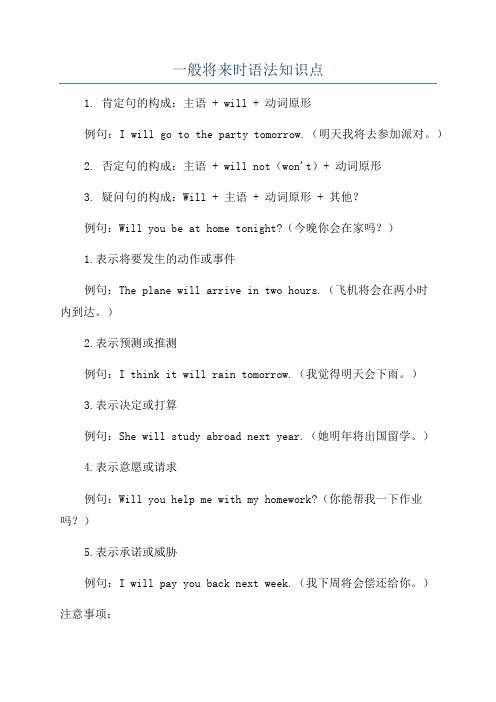
一般将来时语法知识点1. 肯定句的构成:主语 + will + 动词原形例句:I will go to the party tomorrow.(明天我将去参加派对。
)2. 否定句的构成:主语 + will not(won't)+ 动词原形3. 疑问句的构成:Will + 主语 + 动词原形 + 其他?例句:Will you be at home tonight?(今晚你会在家吗?)1.表示将要发生的动作或事件例句:The plane will arrive in two hours.(飞机将会在两小时内到达。
)2.表示预测或推测例句:I think it will rain tomorrow.(我觉得明天会下雨。
)3.表示决定或打算例句:She will study abroad next year.(她明年将出国留学。
)4.表示意愿或请求例句:Will you help me with my homework?(你能帮我一下作业吗?)5.表示承诺或威胁例句:I will pay you back next week.(我下周将会偿还给你。
)注意事项:1.一般将来时用于表示客观事实或不可避免的事情,而不适合用于表示主观意愿或计划。
例句:I will pass the exam.(我一定会通过考试。
)2. 在时间副词或短语中,一般将来时常与表示将来的时间连用,如tomorrow(明天),next year(明年),in two weeks(两周后)等。
例句:He will leave for New York tomorrow.(他明天将动身去纽约。
)3.与一般现在时的区别:一般将来时强调将来的一些时间点或将来发生的动作,而一般现在时则表示现在的状态和经常性动作。
例句:She will meet her friend tomorrow.(她将会明天见她的朋友。
)例句:She often meets her friend for coffee.(她经常和朋友喝咖啡。
【英语】一般将来时知识点(大全)

【英语】一般将来时知识点(大全)一、一般将来时1.The kids may not go to school in the future.They____at home on computers.A. have studiedB. will studyC. studied【答案】B【解析】【分析】句意:孩子们将来可以不上学。
他们在家电脑上学习。
A.have studied 现在完成时态,表示已经发生或完成的动作;B.will study即一般将来时态,表示将要发生的动作;C. studied一般过去时态,表示过去发生的动作。
将来在家里、在电脑上学习,用一般将来时态。
故选B。
2.— Let's go fishing if it this weekend.— But nobody knows if it .A. is fine; will rainB. will be rain; rainsC. will be fine; will rainD. is fine; rains 【答案】 A【解析】【分析】句意:——如果这个周末晴天我们去钓鱼吧。
——但是没人知道是否会下雨。
第一个空前的if引导条件状语从句,意思是“如果”,从句中用一般现在时表示将来;第二个空前的if引导宾语从句,意思是“是否”,根据从句的tomorrow可知用一般将来时;故选A。
【点评】考查动词的时态。
3.— I hear your father has gone to Tokyo on business?— Yes. And he _______ in three weeks.A. has returnedB. will returnC. would returnD. returns【答案】 B【解析】【分析】句意:—我听说你父亲出差去日本了?—是的。
他将在三周后回来。
时间状语in three weeks与一般将来时连用,故选B。
一般将来时的知识点归纳整理
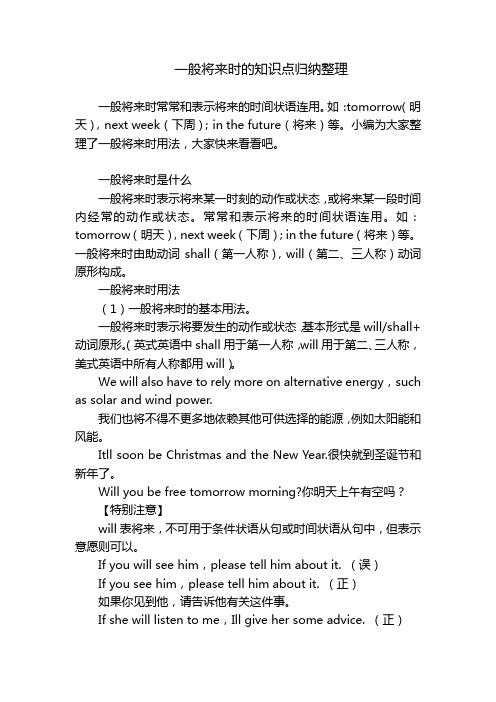
一般将来时的知识点归纳整理一般将来时常常和表示将来的时间状语连用。
如:tomorrow(明天),next week(下周);in the future(将来)等。
小编为大家整理了一般将来时用法,大家快来看看吧。
一般将来时是什么一般将来时表示将来某一时刻的动作或状态,或将来某一段时间内经常的动作或状态。
常常和表示将来的时间状语连用。
如:tomorrow(明天),next week(下周);in the future(将来)等。
一般将来时由助动词shall(第一人称),will(第二、三人称)动词原形构成。
一般将来时用法(1)一般将来时的基本用法。
一般将来时表示将要发生的动作或状态,基本形式是will/shall+动词原形。
(英式英语中shall用于第一人称,will用于第二、三人称,美式英语中所有人称都用will)。
We will also have to rely more on alternative energy,such as solar and wind power.我们也将不得不更多地依赖其他可供选择的能源,例如太阳能和风能。
Itll soon be Christmas and the New Year.很快就到圣诞节和新年了。
Will you be free tomorrow morning?你明天上午有空吗?【特别注意】will表将来,不可用于条件状语从句或时间状语从句中,但表示意愿则可以。
If you will see him,please tell him about it. (误)If you see him,please tell him about it. (正)如果你见到他,请告诉他有关这件事。
If she will listen to me,Ill give her some advice. (正)如果她愿意听我说,我会给她一些劝告。
【考试必备】常与一般将来时连用的时间状语有:next time下次tomorrow明天tomorrow evening明晚before long不久后in the future将来later(on)以后the day after tomorrow后天this afternoon今天下午next year明年(2)一般将来时的其他表达法。
英语知识点:一般将来时

英语知识点:一般将来
时
-CAL-FENGHAI.-(YICAI)-Company One1
英语知识点:一般将来时
一般将来时表示将来某个时间要发生的动作或者存在的状态。
通常与表示将来的时间状语连用,如tomorrow, the day after tomorrow, next year, next month, next week, in 100 years等。
be going to do (动词原形)结构:表示打算、准备做的事情或者肯定要发生的事情。
如:It is going to rain.
will do 结构表示将来的用法:
1. 表示预见
Do you think it will rain
You will feel better after a good rest.
2. 表示意图
I will borrow a book from our school library tomorrow.
What will she do tomorrow
基本构成如下:
一般疑问句构成:
(1)will+主语+do Will Sarah come to visit me next Sunday
(2)there be 结构的一般疑问句:Will there + be Will there be fewer trees Yes, there will. / No, there won’t否定句构成:will + not (won’t)+do Sarah won’t come to visit me next
Sunday. 上面就是为大家准备的英语知识点:一般将来时,希望同学们认真浏览,希望同学们在考试中取得优异成绩。
一般将来时知识点

明思教育牛津英语7B 英语语法 (三 )一般未来时一、一般未来的形式一般未来表示未来某个将要生的作或存在的状,也表示未来常或屡次生的作。
一般未来由助shall 或 will加原形构成, shall 用于第一人称, will用于第二、三人称。
但是在第一人称一般也用will ,其区其实不明。
(或“ be going to+原形)常与tomorrow, next⋯ , in( the ) future, soon, in five days, in two weeks 等用。
如: I shall not come if it rains tomorrow.如明天下雨我就不来。
My father will leave for China next week.我的爸爸下星期要到中国去。
“I ’ll, You ’ll, He ’ll , She’ll , It’ll, We ’ll , They’ll ⋯”是形式。
二.一般未来的句型1.必定句:主 +shall /will++其他成份The workers will build a new school here next year.工人明年将在儿盖一所新学校。
They will go shopping this afternoon.今天下午他将要去物。
We shall have a delicious dinner tonight.今晚我将美餐一。
We shall be there before dark.我天黑前会到达那处。
2.否定句:主 +shall /will+not++其他成份She won’t come back this week.一周她不回来了。
I will not go shopping one hour later.一小此后我不会去物。
He won’t play football with you before he finishes his work.他干完活后才能跟你踢足球。
一般将来时知识点总结
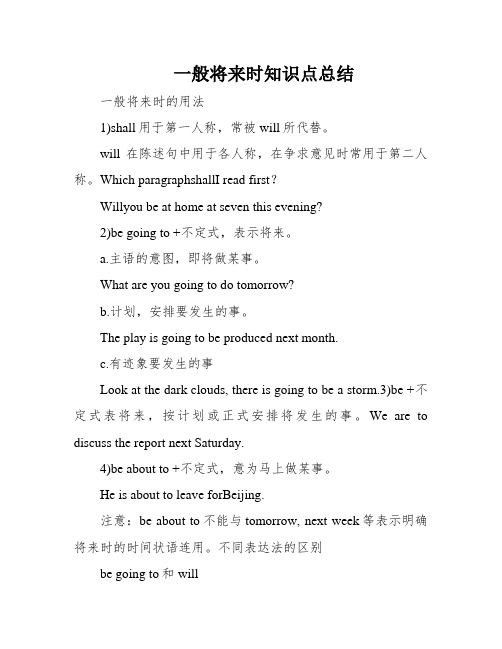
一般将来时知识点总结一般将来时的用法1)shall用于第一人称,常被will所代替。
will在陈述句中用于各人称,在争求意见时常用于第二人称。
Which paragraphshallI read first?Willyou be at home at seven this evening?2)be going to +不定式,表示将来。
a.主语的意图,即将做某事。
What are you going to do tomorrow?b.计划,安排要发生的事。
The play is going to be produced next month.c.有迹象要发生的事Look at the dark clouds, there is going to be a storm.3)be +不定式表将来,按计划或正式安排将发生的事。
We are to discuss the report next Saturday.4)be about to +不定式,意为马上做某事。
He is about to leave forBeijing.注意:be about to不能与tomorrow, next week等表示明确将来时的时间状语连用。
不同表达法的区别be going to和will用于前提句时,be going to表未来,will表志愿。
If you are going to make a journey, you''d better get ready for it as soon as possible.Now if you will take off your clothes, we will fit the new clothes on you in front of the mirror.be to和be going to be to表示客观安排或受人指示而做某事。
be going to透露表现客观的打算或打算。
- 1、下载文档前请自行甄别文档内容的完整性,平台不提供额外的编辑、内容补充、找答案等附加服务。
- 2、"仅部分预览"的文档,不可在线预览部分如存在完整性等问题,可反馈申请退款(可完整预览的文档不适用该条件!)。
- 3、如文档侵犯您的权益,请联系客服反馈,我们会尽快为您处理(人工客服工作时间:9:00-18:30)。
明思教育牛津英语7B英语语法(三)一般将来时一、一般将来时的动词形式一般将来时表示将来某个时间将要发生的动作或存在的状态,也表示将来经常或反复发生的动作。
一般将来时由助动词shall或will加动词原形构成,shall用于第一人称,will用于第二、三人称。
但是现在第一人称一般也用will,其区别并不明显。
(或“be going to + 动词原形)常与tomorrow, next… , in (the)future,soon, in five days,in two weeks等连用。
如: I shall not come if it rains tomorrow.如明天下雨我就不来。
My father will leave for China next week.我的爸爸下星期要到中国去。
“I’ll, You’ll, He’ll , She’ll , It’ll, We’ll , They’ll …”是简缩形式。
二.一般将来时的句型1.肯定句:主语+shall /will+动词+其他成份The workers will build a new school here next year.工人们明年将在这儿盖一所新学校。
They will go shopping this afternoon. 今天下午他们将要去购物。
We shall have a delicious dinner tonight. 今晚我们将美餐一顿。
We shall be there before dark. 我们天黑前会到达那里。
2.否定句:主语+shall /will+not+动词+其他成份She won’t come back this week.这一周她不回来了。
I will not go shopping one hour later. 一小时之后我不会去购物。
He won’t play football with you before he finishes his work.他干完活后才能跟你踢足球。
3.疑问句:shall /will+主语+动词+其他成份Will you be back in ten minutes? 十分钟后你会回来吗?Will you please open the window? 请你打开窗户好吗?Shall we get something hot to drink? 我们喝一些热饮怎么样?4.特殊疑问句:特殊疑问词+shall /will+主语+动词+其他成份Where will you go next week? 下星期你去哪?What sall I do?我怎么办呢?How many books will they get? 他们将有多少本书?三.will, be going to …, be to…, be about to…的区别1.be going to +不定式,表示将来。
表示打算、准备做的事或即将发生或肯定要发生的事。
be going to和will相比,be going to通常表示主观,will通常表示客观。
What are you going to do tomorrow? 明天你要做什么?Look at the dark clouds, there is going to be a storm. 看看这些黑云,将有一场暴风雨。
It’s going to be a fine day tomorrow.明天将会是个好天。
It is going to rain. 要下雨了。
2.“be to+动词原形”表示按计划要发生的事或征求对方意见。
这种结构表示计划中约定的或按职责、义务要求必须去做的事或即将发生的动作。
We are to have a meeting next Saturday. 下个周日我们有个会。
The boy is to go to school tomorrow. 这个男孩明天要去上学。
Are we to go on with this work? 我们继续干吗?The president is to visit China next week.总统下周来访中国。
3.“be about to+动词原形”表示即将发生的动作,意为:很快,马上。
后面一般不跟时间状语。
这一结构用于表示客观就要发生的事,表示马上就要发生。
一般不再与时间状语连用。
Don’t go out. We’re about to have a meeting. 别出去了,我们很快就开会了。
I was about to start when it began to rain.我刚要出发就下起雨来了。
He is about to leave for Shenyang.他将要离开去沈阳。
We are about to leave. 我们马上就走。
The film is about to begin. 电影马上就要开始了。
四一般现在时表将来1)下列动词come, go, arrive, leave, start, begin, return的一般现在时可以表示将来,主要用来表示在时间上已确定或安排好的事情。
例如:The train leaves at six tomorrow morning. 火车明天上午六点开。
When does the bus star? It stars in ten minutes. 汽车什么时候开?十分钟后。
2)以here, there等开始的倒装句,表示动作正在进行。
例如:Here comes the bus. = The bus is coming. 车来了。
There goes the bell. = The bell is ringing. 铃响了。
3)在时间或条件句中。
例如:When Bill comes (不是will come), ask him to wait for me. 比尔来后,让他等我。
I'll write to you as soon as I arrive there. 我到了那里,就写信给你。
4)在动词hope, take care that, make sure that等的宾语从句中。
例如:I hope they have a nice time next week. 我希望他们下星期玩得开心。
Make sure that the windows are closed before you leave the room.离开房间前,务必把窗户关了。
五.用现在进行时表示将来下列动词come, go, arrive, leave, start, begin, return等现在进行时可以表示将来。
例如:I'm leaving tomorrow. 明天我要走了。
Are you staying here till next week? 你会在这儿呆到下周吗?六.注意事项1. be about to 不能与tomorrow, next week 等表示明确将来时的时间状语连用。
2. Let’s …的附加疑问通常使用“…, shall we ?”。
Let’s hav e a rest, shall we?3. 问句是“Shall…?”,答句就用“shall ~”;问句用“Will …?”,答句就用“will ~ ”。
要前后保持一致。
Shall you go to school next week ?Yes, I shall . We’ll have an exam .Will you have an exam tomorrow?Yes, I will. / No, I won’t.一般将来时练习:()1. He _______ able to come on Friday because he fails in his exam.A. will be notB. will not beC. is going to beD. isn’t going be()2. – When ________ again?--When he ____________, I’ll let you know.A. he comes ;comesB. will he come;will comeC. he comes ;will he comeD. will he come;comes()3. Do you think Tom ______________ his uncle if he arrives?A. calledB. callsC. will callD. is calling()4. Don’t get off the bus until it_______.A. will stop B. stops C. shall stop D. is stopped ()5. Let’s have dinner befor e the sun ____________.A. go downB. goes downC. will go downD. went down()6. Don’t you know our town at all?No, this is the first time I ___________ here.A. amB. wasC. have beenD. will be()7. We ________ begin our lessons if you _________ ready.A. will ; will beB. shall ; Will getC. will ; getD. /; are()8. I’ll tell her about it as soon as she ___________ back.A. shall comeB. will comeC. comesD. is going to come()9. Your shirt is dirty.________ it for you?A. Am I going to washB. Will I washC. Am I washingD. Shall I wash()10. Look at these clouds, it _______________. A. will be raining B. is going to rain C. rains D. is to rain()11. It ______ hours to do the job.No, it won’t.A. has takenB. is takingC. will takeD. would take()12. If you don’t mind, I __________ off the TV set.A. will turnB. am turningC. would turnD. had turned()13. You haven’t played hockey before, have you?No, I haven’t.And you think you ________, don’t you ?A. would winB. were going to winC. will winD. win()14. Shall I call a taxi for you?No, thanks. __________ one myselfA. I callB. I’ll callC. I’d callD. I called()15. It’s Saturday tomorrow. I’m glad we ______ any classes.So am I. I’ll go fishing. Would you lik e to go with me?A. haven’t hadB. won’t haveC. don’t haveD. wouldn’t have() 16. She ________ him a lovely dog on his next birthday.A. givesB. gaveC. will givingD. is going to give() 17. He ______us the truth as soon as he gets there.A. tells B. has told C. will tell D. told () 18. He ________ in four days.A. coming backB. came backC. will come backD. is going to coming back() 19. If it ________ tomorrow, we’ll have a picnic.A. isn’t rainB. won’t rainC. doesn’t rainD. doesn’t fine() 20. – Will his parents go to see the film tomorrow?No, ________.A. they shall not.B. they won’tC. they aren’t.D. they don’() 21. Who ________ we ________ swimming with tomorrow afternoon?A. will;goB. do;goC. wil ; goingD. shall ; go() 22. We ___ the homework this way next time.A. do B. will do C. going to doD. will doing () 23. Tomorrow he ________ a kite, and then ________ boating.A. will fly; will goB. will fly; goesC. is going to fly; will goesD. flies; will go() 24. The day after tomorrow he________ a volleyball match.A. will watchingB. watchesC. is watchingD. is going to watch() 25. There ________ a birthday party this Monday.、A. shall beB. will beC. shall going to beD. will going() 26. There __________ a meeting tomorrow afternoon.A. will be going toB. will going to beC. is going to beD. will go to be() 27. President Washington ________ here next month.A. isn’t workingB. doesn’t workingC. isn’t going to workingD. won’t work() 28. He ________ very busy this week, he ________ free next week.A. will be ; isB. is ; isC. will be ; will beD. is ; will be() 29. There ________ a dolphin show in the Dalian’s zoo tomorrow evening.A. wasB. is going to haveC. will haveD. is going to be() 30.–________ you ________ free tomorrow?– No. I ________ free the day after tomorrow.A. Are ; going to;willB. Are ; going to be;willC. Are ; going to;will beD. Are ; going to be;will be() 31.Mother ________ me an exciting present on my next birthday.A. will giveB. will giveC. givesD. give() 32.– Shall I buy a cup of tea for you?–________.A. No, you won’t.B. No, you aren’t.C. No, please don’t.D. No, please.() 33.– Where is the morning paper?– I ________ it for you at once.A. getB. am gettingC. to getD. will get() 34.________ a concert next Saturday?A. There will beB. Will there beC. There can beD. There are() 35 If they come, we ______ a meeting.A. haveB. will haveC. hadD. would have to be() 36. They ________ an English evening next Sunday.A.are havingB. are going to haveC. will havingD. is going to have() 37. ______ you _______ free next Sunday? A. Will ;are B. Will;be C. Do ;be D. Are ;be () 38. He ________ there at ten tomorrow morning. A. will B. is C. will be D. be() 39. ________ your brother ________ a magazine from the library?A. Are;going to borrowB. Is;going to borrowC. Will;borrowsD. Are;going to borrows () 40. – Shall I come again tomorrow afternoon?–________.A. Yes, pleaseB. Yes, you willC. No, please.D. No, you won’t.() 41. It ________ the year of the horse next year.A. is going to beB. is going toC. will beD. will is() 42. __ open the window?A.Will you please B. Please will you C. You please D. Do you () 43. –Let’s go out to play football, shall we?– OK. I ________.A. will comingB. be going to comeC. comeD. am coming() 44. It ________ us a long time to learn English well.A. takesB. will takeC. spendsD. will spend() 45. The train ____ at six oc’lo ck.A. going to arriveB. will be arriveC. is going toD. is arriving答案:1-5 B D C B B6-10 C C C D B11-15 C A C B B16-20 D C C C B21-25 D B A D B26-30 C D D D D31-35 B C D B B36-40 B B C B A41-45 A A D B D。
